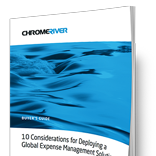
Editor’s Note: This article is the second in a four-part series on how to report travel and entertainment expenses. Part 1 can be found here.
When John’s company sent him on a three-day business trip out of state, his flight and hotel were paid for directly. John saved his receipts for meals and miscellaneous costs and submitted an expense report totaling $195. His next paycheck included the $195 but did not withhold any taxes from the reimbursement. Since his company’s travel expense policy is based on an IRS accountable plan, that $195 will also not show up at the end of the year as taxable income on John’s W-2.
When it comes to travel expenses, your company can often provide tax-exempt reimbursements to employees and contractors by following the IRS’ accountable-plan guidelines, according to Marianne Couch, principal of Cokala Tax Information Reporting Solutions.
However, while an accountable plan offers benefits, it also increases the risk of an IRS audit, according to Couch. In an audit, the IRS takes the following actions.
- Identifies which department handles compensation for your company’s executives and officers, examining available reports and meeting notes.
- Reviews executive salaries and benefits using employment contracts and severance agreements, and identifies all payments and loans made between your company and its executives and officers.
- Examines a sample of monthly expenses reported by executives.
- Evaluates your company’s accountable plan to determine whether it follows IRS rules.
- Searches accounts payable for payments not reported on a Form W-2 or Form 1099, using accounting codes and an executive’s name, title or Social Security number. Any payments not reported must be documented as exemptions, or they may be deemed taxable.
If you understand what an IRS audit is looking for, your company can preemptively assess areas that might present red flags. The key to conducting regular assessments is making the process easy and intuitive. With effective analytics software like Chrome River ANALYTICS, managers can track global and departmental spending, check on cost-center activity, compare individual user activity, and drill down into the details when needed — similar to the way the IRS would conduct an audit. Users can review past executive expenses and analyze current ones to compare amounts and examine specific transactions and payment codes.
An audit of your company’s expense reimbursements doesn’t have to be a stressful process, especially if you know what to expect and plan using smart expense report software and analytics tools. For more tips, watch for the rest of our four-part series on how to report travel and entertainment expenses.
Search
Subscribe
Latest Posts
- Driving AP Success With Automation Part 3: How to Save Time and Money While Increasing Compliance
- Driving AP Success With Automation Part 2: How to Create More Efficient Processes With AP Automation
- VAT IT Partners With Emburse to Help Companies Save 27% on Expenses
- Driving Success With Automation Part 1: 4 Common AP Management Bottlenecks
- The Future of Finance: 5 Predictions For Digital Transformation in 2022 And Beyond
Posts by Category
Our choice of Chrome River EXPENSE was made in part due to the very user-friendly interface, easy configurability, and the clear commitment to impactful customer service – all aspects in which Chrome River was the clear winner. While Chrome River is not as large as some of the other vendors we considered, we found that to be a benefit and our due diligence showed that it could support us as well as any large players in the space, along with a personalized level of customer care.
We are excited to be able to enforce much more stringent compliance to our expense guidelines and significantly enhance our expense reporting and analytics. By automating these processes, we will be able to free up AP time formerly spent on manual administrative tasks, and enhance the role by being much more strategic.
